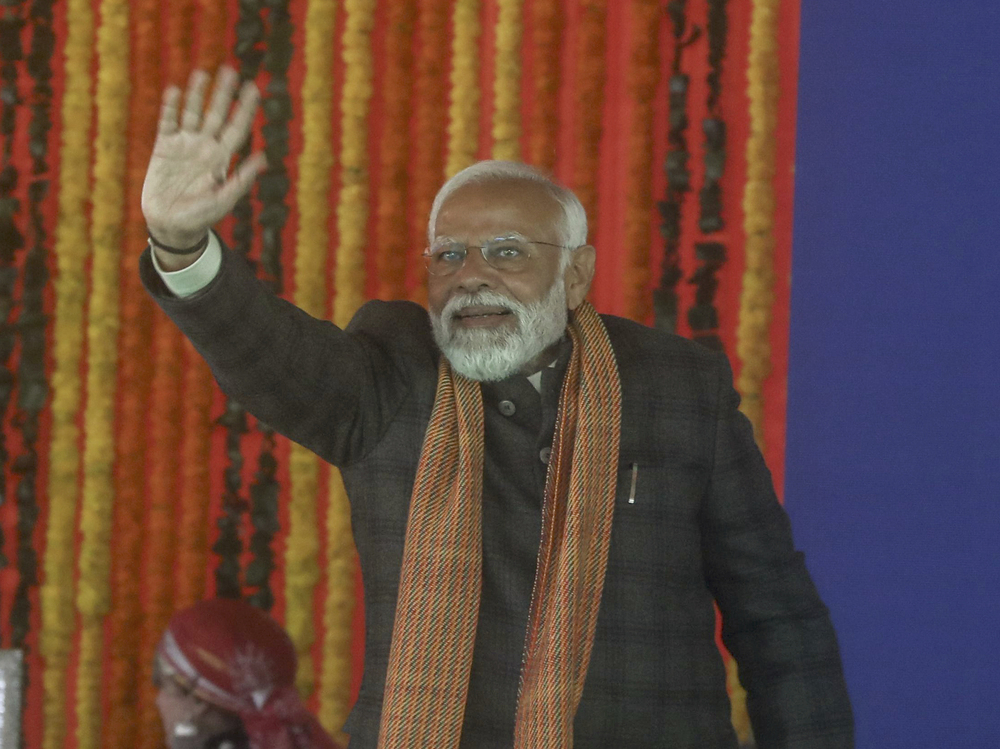
MUMBAI, India — The world's largest democratic polling exercise gets underway on April 19, India's election commission announced over the weekend. It will involve over a million booths, 15 million polling personnel, and will decide the future for 1.4 billion Indians.
As in the last election in 2019, the elections this year will be conducted in seven phases over more than six weeks. Results will be out on June 4.
At the center of this election is Narendra Modi, India's wildly popular prime minister. In his two terms since 2014, human rights groups and liberal critics of Modi say the prime minister and his party have eroded the secular democratic foundations of India. Some of Modi's prominent critics and political opponents have been detained.
Some lawyers and former judges say an analysis of the cases taken up by India's vast judiciary and the decisions it's made suggests a cowed, timid justice system that bends to the influence of the prime minister's allies. Rights groups such as Amnesty International and Hindutva Watch have also documented incitement, communal attacks and even state-sanctioned violence against minorities, particularly India's 200 million Muslims.
But criticism that India is hurtling into authoritarianism seems to make little difference. A recent Pew Research survey holds clues on why: 85% of Indians, it found, think military rule or an authoritarian leader would be good for their country.
This time, Modi has tasked workers at his Hindu nationalist Bharatiya Janata Party (BJP) with securing 400 out of 545 parliamentary seats.
As the workers and leaders hit the road, here are three things to know.
Modi thinks he will cruise to a third term

Modi certainly thinks he will win. Earlier this month, he even called an all-hands meeting with his ministers to discuss the government's priorities in the 100 days after elections.
But his past two terms have been a mixed bag.
The Modi government splurged on infrastructure projects like roads and airports, distributed free food grains to hundreds of millions and initiated cash transfers to low-income groups. But his decision to take high-value currency out of circulation in 2016, and impose nationwide shutdowns during the COVID-19 pandemic between 2020-21 also undid the economy. As the country recovered, an Oxfam report found the rich got richer while the bottom half of the population owned only 3% of the country's wealth.
In all these years, analysts say the BJP's strategic use of Hindu nationalism, and Modi's cult of personality, has helped them coast through the worst of crises.
The BJP is India's richest party, according to a recent report by the Association for Democratic Reforms, an independent election watchdog. And in the decade of Modi's rule, observers say, the party has also seen a growing number of dedicated cadres and increasingly pliant media, often due to fears of a government crackdown.
Across India, Modi's mugshot is everywhere — from daily advertisements in newspapers and TV channels on government schemes, to cardboard cutout images of him for citizens to use as selfie props. Several of his loyal ministers' handles on X, formerly Twitter, identify them as "Modi's family." The party also used India's G20 presidency to pitch Modi as "Vishwaguru" or "teacher of the world."
Meanwhile, India's opposition parties are struggling. A coalition formed last year of 40 opposition parties has fractured. The president of India's main opposition Congress party, Mallikarjun Kharge, is a veteran politician but lacks Modi's mass appeal. The opposition lacks a satisfactory answer for what many fence-sitters ask: "If not Modi, then who?"
Will the elections be free and fair?

The integrity and outcome of India's polling process is largely respected by international observers. But in the run-up, parties often indulge in practices that violate election codes.
In its press conference on Saturday, the election commission said polling in India carries four main challenges: violence, misinformation, violations of good conduct (such as personal insults of political opponents), and bribery. Over the past five years, it seized over $400 million in illicit cash in 11 state elections.
Opposition parties have also questioned the Election Commission of India's own conduct. They say the polling body has not sanctioned the BJP despite evidence of election law violations by the party. The commission has denied accusations of bias.
Separately, only days ahead of announcing elections, Modi appointed two ex-bureaucrats to the three-headed election commission. One of the leaders of India's main opposition party who was part of a panel to pick commission heads said the government rushed the selection process and "chose the candidates they wanted."
A scandal over electoral bonds is a new stumbling block for the BJP
The BJP came to power in 2014 on the back of an anti-corruption campaign. "Na khaoonga, na khaane doonga (I won't indulge in corruption, nor will I let others)," candidate Modi had promised.
In 2018, the BJP introduced "electoral bonds" that allowed for individuals and corporations to donate money to political parties anonymously. Over the next five years, the party became India's richest, taking in over half of $1.5 billion in total political donations raised between all parties.
Last month, the Supreme Court scrapped the scheme and ordered the donor details to be made public. Indian newsrooms reporting on this found a pattern: at least 21 companies — both big and small — donated around $130 million, often after raids by law enforcement agencies.
Jairam Ramesh, the general secretary of the opposition Congress party, whose own government came undone in 2014 following a string of corruption scandals, called the electoral bonds scheme the "biggest scam of independent India."
It's too early to say if the scandal will halt the Modi juggernaut. But analysts say a contest that was seen as one-sided until only a week ago has just got a lot more competitive.







